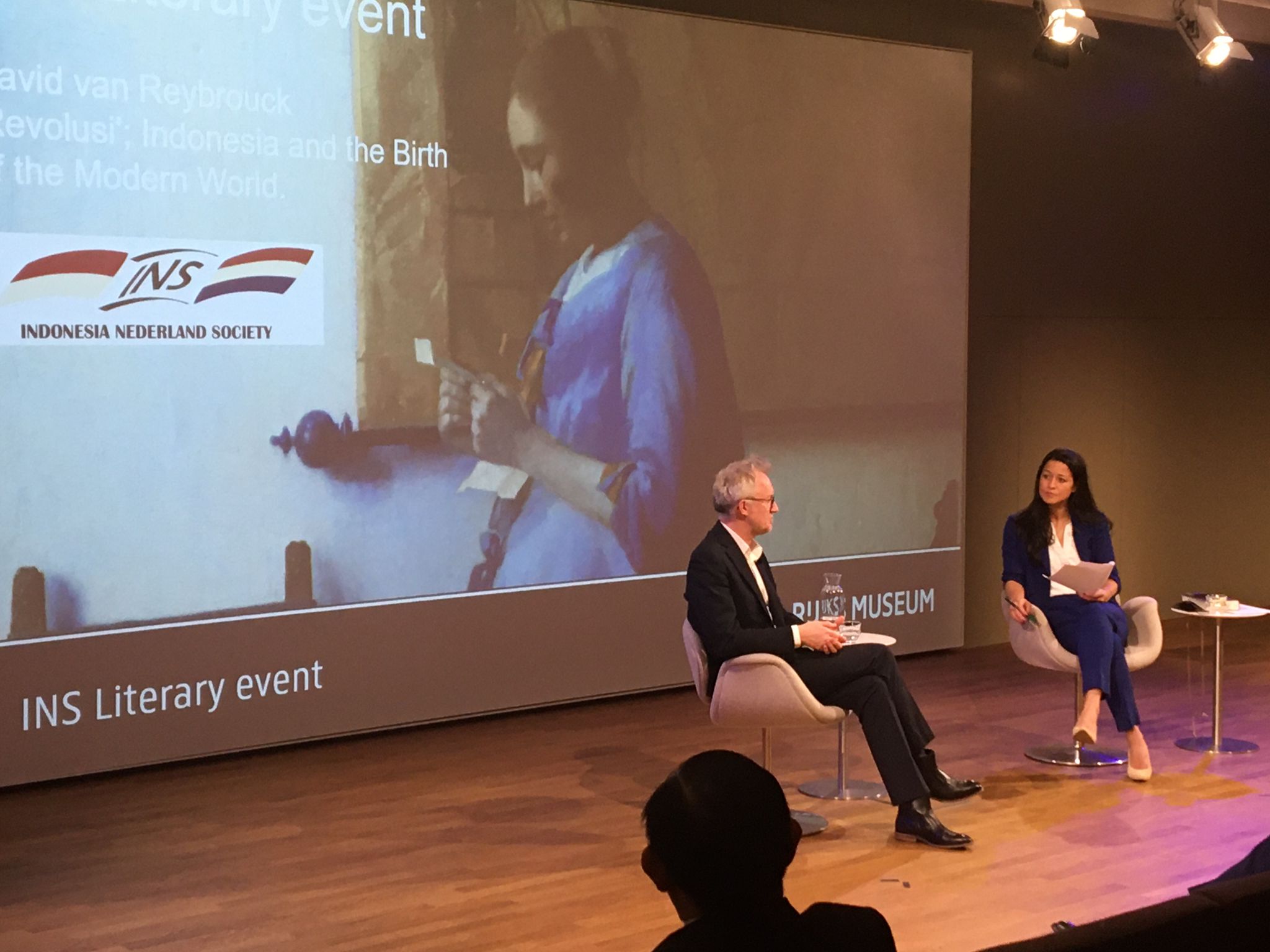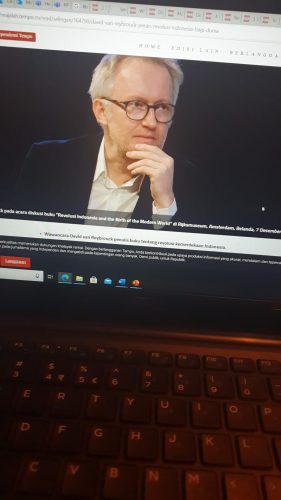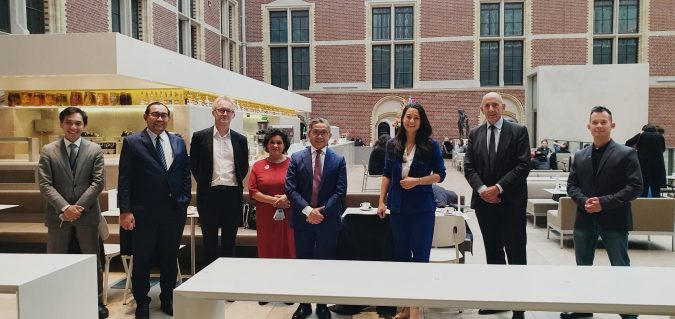
09 Feb 2022
In collaboration with the Rijksmuseum in Amsterdam, the Indonesia Nederland Society organized a literary event at the museum on 7 December 2021. Our Guest speaker was David van Reybrouck, author of ‘Revolusi, Indonesia and the Birth of the Modern World.’ Referring to the upcoming exhibition of the Rijksmuseum Taco Dibbets, Director of the Rijksmuseum said it was a happy coincidence that Van Reybrouck and the Rijksmuseum were using the same title for an important episode in the history of the Dutch-Indonesian relationship. Hopefully the exhibition ‘Revolutie’ will attract broad public attention contributing to open dialogue and reflection.
Talkshow with David van Reybrouck hosted by Andhika Rutten
 What brought you to write this book?
What brought you to write this book?
It all started when he read a copy of the Max Havelaar. ‘I was in the Congo for my book about the Congo when a man showed me his collection of books, including the Max Havelaar.’ In this Dutch book he found many parallels with the colonial past of Congo, but he didn’t think it was up to him to write about what Geert Mak would later call ‘a too sensitive subject for the Dutch.’ Until later, when he was in a radio interview and by accident asked for witnesses of the colonial past. One of the respondents was ‘an old lady who in her childhood had lived in the house in Linggarjati where the negotiations of 1946 were held.’ Joty ter Kulve, one of his dear friends now, gave him a reason to start the project. It would take him five years. Van Reybrouck still wonders why there is so much interest for his book in The Netherlands. ‘There are many painful things in it. Is it something sado-masochistic?’ But he observes a ‘willingness in this society to understand their complex relationship with the past.’
It is said the Dutch are very proud about their history. How do you perceive the different perspectives on the colonial past?
‘The Dutch are more proud about their colonial past than the British.’ David van Reybrouck came along a study in which 50 % of the Dutch were proud, 25% were longing for the return of the past (‘a lost paradise’) and only 6% felt ashamed. ‘It does surprise me, the amount of historical illiteracy in the Netherlands!’ In Dutch text books the Dutch see themselves through a lens of freedom and tolerance. ‘In my view a structural overestimation of own virtues. In Belgium we don’t see ourselves like this.’ An example to him is the historical canon comprised in 2015: of the 60 rooms, only one minimalistic room was attributed to the overseas regions the Dutch Indies and Suriname, despite the for centuries long relationship. ‘In the Netherlands there is not so much a shortage of historical knowledge, as well as a shortage in historical transmission.’ He understands where it comes from. ‘When I did my PhD studies in Leiden in the nineties of the former century Ajax became stakeholder on the Amsterdam stock market. The neo-liberal paradigm was dominant.’
In his view Indonesia is doing a better job in the field of Indonesian textbooks for secondary education and dioramas. He also noticed a kind of longing for the colonial past when he saw young Indonesian dressed in colonial costumes in Jakarta. ‘For them the past is more solid and for the Dutch the past is more liquid.’ He adds: ‘Facing climate change we have to overcome this liquid sense of history.’
Talking about colonial guild what is your view on repair paying?
Considering that colonial guild is difficult to calculate and observing that Germany went deep into moral reflection, David van Reybrouck’s suggestion would be: ‘If we incorporate that we are on the brink of climate change and that European countries contributed to the carbon emissions: put money into a fund. We should pay promises for climate change. We have been pollutioners. Now it is time for a more generous and wiser attitude.’
What do you hope your book will bring about?
‘I hope my book will be a tool to help the Dutch to come to terms with their colonial past, and also to stop being a land of victimhood. All attempts to start a dialogue are extremely important.’ He also hopes to reach an international audience. His book will be translated in 10 language. The main reason why he began to write about this history, was because it is world history. ‘Indonesia was the first country after World War II that became independent and it was an example for many other countries in Asia and Africa. That’s why the Bandung Conference became so influential. Not only for India and Egypt but also for countries in South America and even for the Bronx in the United States of America.‘ He regrets that ‘the spirit of Bandung has been killed by the US in 1965, when Suharto became president of Indonesia, General Mobutu became president of Congo.’
Why did you want to interview the elderly people?
Witnesses of the decolonization, if they are still alive, are very elderly men and women who live in distant places. Van Reybrouck was keenly aware that he had to find them in time. ‘There are traumas that are never forgotten. I interviewed people who did not know what they had for lunch but who still very clearly know the massacres they have seen.’ He noticed that the elderly men and women, who for their children had been silent about their traumas, did share their life histories with their grandchildren. ‘They have become old enough to share it, because of having much more distance. It is the grandchildren with whom the elderly people share their traumas.’ He underscores: ‘This is important for us because of the continuity. Globally the past is a challenge to get continuity.’
Returning to the exhibition ‘Revolutie’ in the Rijksmuseum he concludes: ‘Today, only today we see two countries working together as equals, but with different perspectives to prepare an exhibition about their common history. We lost half a century!’




